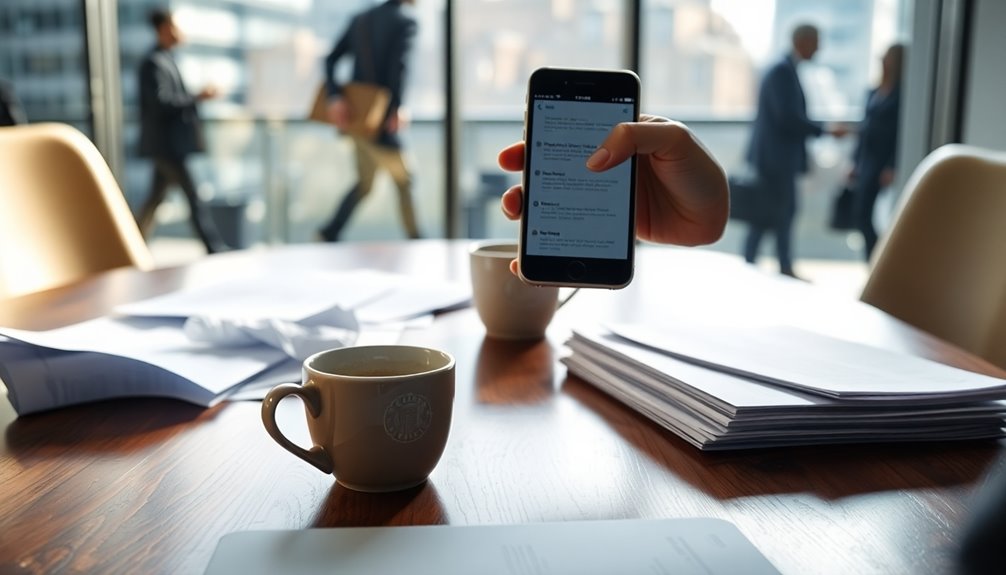A job interview isn't just a quick chat; it's a two-way evaluation of fit for both you and the company. You're not only showcasing your skills but also gauging if the company aligns with your values. Effective communication plays a huge role here, especially in creating a strong first impression through eye contact and body language. Watch for positive signs—engaging conversations and discussions about growth opportunities mean the interview's going well. Your preparation and ability to reflect on your performance afterward can greatly boost your chances. There's a lot more to uncover about the interview landscape and its evolving trends.
Key Takeaways
- A job interview is a mutual evaluation of fit for both the candidate and the company's culture and values.
- Positive body language and engaging conversation indicate a strong connection and interest from the interviewer.
- Using the STAR Technique helps structure responses effectively, showcasing qualifications while capturing the interviewer's attention.
- First impressions formed within seconds can significantly influence the overall perception and outcome of the interview.
- Continuous self-reflection and improvement after each interview enhance performance and increase the chances of success in future opportunities.
Understanding the Interview Dynamic

Understanding the interview dynamic means recognizing that it's not just about you answering questions; it's a two-way street where both you and the interviewer evaluate if you're a good match for the role and the company culture. As you engage in the interview, pay attention to how the hiring managers react. Positive signs, like an engaging conversation flow and specific discussions about job responsibilities, often indicate genuine interest in you as a candidate.
To build rapport, focus on non-verbal cues. Maintain eye contact, observe body language, and practice active listening. These actions show your enthusiasm and investment in the conversation. When the interviewer asks open-ended questions, take the opportunity to showcase your qualifications while also gauging their responses.
After the interview, don't forget about follow-up communication. A thoughtful follow-up reinforces your interest and professionalism, while also giving you a chance to clarify any points or misunderstandings that may have arisen. By understanding this dynamic, you position yourself not just as a candidate but as a potential team member who aligns with the company culture and values. Additionally, recognizing the importance of clear communication during a breakup can enhance your interpersonal skills, making you more effective in interviews.
The Psychology of First Impressions

Your first impression can set the tone for the entire job interview experience. In just 7 to 30 seconds, you'll shape how the interviewer perceives your suitability for the role. Research shows that non-verbal cues, like body language and facial expressions, account for about 55% of that initial impression.
Maintaining eye contact is vital; it makes you appear more trustworthy and engaged. A positive first impression can create a halo effect, causing interviewers to overlook minor flaws in your qualifications. Conversely, a negative first impression can lead to lasting bias, making it hard for you to recover—even if you excel later in the interview.
To help you understand the impact of these elements, consider the following:
| Element | Impact |
|---|---|
| Body Language | Conveys confidence and openness |
| Eye Contact | Signals engagement and trust |
| Positive Impression | Encourages a favorable bias |
The Role of Communication

First impressions are just the beginning; the way you communicate throughout the interview can greatly influence the outcome. To make a lasting impact, focus on these essential communication skills:
- Maintain Eye Contact: This shows confidence and engagement, making your responses more impactful.
- Use the STAR Technique: When answering questions, structure your responses by outlining the Situation, Task, Action, and Result. This method organizes your thoughts and presents your experiences clearly.
- Practice Active Listening: Pay attention to the interviewer's questions and comments. This allows you to respond thoughtfully and demonstrates genuine interest in the conversation.
- Mind Your Body Language: Open postures and appropriate gestures can convey confidence and create a positive atmosphere during the interview.
Lastly, don't forget the follow-up! Sending a thank-you note that references specific topics discussed not only reinforces your professionalism but also reiterates your interest in the position. Effective communication is a powerful tool that can set you apart and enhance your chances of success in any interview. Make sure to leverage it wisely!
Signs of a Successful Interview

Spotting the signs of a successful interview can give you valuable insights into how well you connected with the interviewer. If your interview lasts for the full scheduled time, that's often a good indicator. It shows the interviewer's enthusiasm to engage and evaluate you thoroughly. Pay attention to their positive body language, like smiling and maintaining eye contact. This behavior signifies genuine interest in your responses and background.
Another sign to look for is how smoothly the conversation flows. If you find yourselves discussing shared interests or experiences, it suggests a strong rapport and a good cultural fit. Additionally, if the interviewer discusses growth opportunities within the company, it reflects their interest in your long-term potential and alignment with their goals.
Finally, don't underestimate the power of follow-up communication. If you receive a thank-you email or inquiries about your availability for next steps, it reinforces your positive impression and indicates the employer's continued interest. Recognizing these signs can help you gauge the success of your interview and prepare for what's next in your job search journey.
Common Misconceptions About Interviews

Many people think that a job interview automatically leads to an offer, but that's not always the case. You might feel pressured to deliver perfect answers, yet interviewers often value authenticity over perfection. Also, if your interview gets cut short, it doesn't necessarily mean you failed; various factors can influence the timing.
Interview Equals Job Offer
A common misconception is that landing a job interview guarantees an offer, but that's far from the truth. An interview is just one part of a complex evaluation process. Here are four key factors that influence the outcome:
- Cultural Fit: Employers assess if you align with their values and work environment, which can be just as essential as your skills.
- Interpersonal Skills: Your ability to communicate and build rapport during the interview is crucial. They look for how well you connect with others.
- Interview Length: A long interview doesn't always mean you're the front-runner; it could simply be a thorough assessment or a busy schedule.
- Interviewer's Demeanor: Just because an interviewer seems enthusiastic, it doesn't automatically reflect their intent. They often maintain a professional facade, regardless of their thoughts about your candidacy.
Understanding these misconceptions can help you approach interviews with a more realistic mindset. A job offer isn't guaranteed just because you've made it to the interview stage. It's about demonstrating that you're the right fit for the role and the company culture. Additionally, recognizing the importance of emotional readiness can play a significant role in your overall performance during the interview process.
Perfect Answers Required
Job interviews often spark the belief that perfect answers are the key to success, but that's a misconception that can set you up for disappointment. Interviewers usually prioritize authenticity and your ability to engage in a meaningful conversation. They're not looking for candidates who recite answers verbatim; instead, they want to hear about your experiences and thought processes.
Moreover, many candidates underestimate the importance of asking questions during the interview. Doing so shows genuine interest and helps you assess if the company is a good fit for you. Remember, it's not just about whether the interview went well for them; it's also about whether you feel aligned with their culture and values. Additionally, maintaining a high vibrational energy can positively influence the overall interaction and your own confidence levels.
Here's a quick overview of common misconceptions:
| Misconception | Reality | Importance of Soft Skills |
|---|---|---|
| Perfect answers are required. | Authenticity matters more. | Communication is key. |
| Only technical skills count. | Soft skills like adaptability are essential. | Team fit enhances success. |
| Interviews assess only qual. | They're a two-way street. | Culture fit is vital. |
Short Interviews Indicate Failure
Short interviews can leave candidates feeling uneasy, often leading to the misconception that brevity equals failure. In reality, short interviews—typically lasting less than 30 minutes—often signal a lack of interest from the interviewer. This can reflect poorly on your compatibility for the role. Here's what you should know:
- Lack of Interest: Short interviews may indicate that the interviewer isn't fully engaged or invested in finding the right candidate.
- Rushed Evaluation: If the interview's too brief, it's likely the interviewer didn't have enough time to assess your qualifications properly.
- Poor Rapport: A lack of connection during the conversation can lead to a quick wrap-up, suggesting you didn't click with the interviewer.
- Ideal Duration: For entry-level positions, interviews should ideally last 30-45 minutes, allowing for meaningful discussions about your fit and potential.
Understanding that a shorter interview often raises red flags can help you manage your expectations. It's not just about the time spent; it's about the depth of conversation and connection. So, don't equate short interviews with success—more often than not, they indicate missed opportunities.
Strategies for Effective Self-Reflection

Reflecting on your interview performance can be a game-changer in your job search journey. Self-reflection allows you to analyze your performance critically, helping you identify mistakes and areas for improvement. Start by engaging in self-debriefing right after each interview. Take some time to jot down your thoughts on what went well and what didn't. This practice promotes constructive analysis and enables you to recognize patterns in your strengths and weaknesses over time.
Keeping a journal to track your interview experiences can further facilitate this process. By reviewing your entries, you'll gain insights into your progress and areas needing attention. Additionally, engaging in self-reflection can greatly reduce anxiety about future interviews. When you're aware of your skills and areas for improvement, you'll feel more prepared and confident.
Acknowledge your personal strengths during this reflection. Recognizing what you excel at not only boosts your confidence but also equips you to present yourself more effectively in future job opportunities. Finally, by identifying specific areas for skills development, you can target your efforts, enhancing your performance in subsequent interviews. Make self-reflection a regular part of your interview strategy, and watch your success grow.
Navigating Post-Interview Follow-Up

A well-timed post-interview follow-up can greatly impact your chances of landing the job. Sending a thank-you note within 24 hours not only shows gratitude but reinforces your interest in the role. To make your follow-up effective, consider these key steps:
- Send a thank-you note: Make sure to express your appreciation promptly. This helps you stand out in the hiring manager's mind.
- Personalize your message: Reference specific topics discussed during the interview to strengthen your connection and highlight your qualifications.
- Inquire about interview status: If you haven't heard back, wait at least 10 business days before following up. This shows professionalism and respect for the hiring process.
- Address misunderstandings: If there were questions you felt you answered poorly, use your follow-up to clarify your thoughts and demonstrate your commitment to effective communication.
Trends Shaping the Job Market

As you navigate today's job market, you'll notice that interview formats are evolving, with many companies opting for virtual interviews. The demand for specific skills is shifting, particularly towards tech and soft skills, reflecting what employers value most. Plus, the rise of remote work is changing how you approach potential roles and responsibilities. Additionally, companies are increasingly leveraging AI automation to enhance their hiring processes, allowing for more efficient candidate evaluations.
Evolving Interview Formats
Evolving interview formats are transforming how candidates and employers connect in today's job market. With the rise of technology and changing workplace dynamics, various innovative approaches are emerging. Here's what you should know:
- Virtual Interviews: About 70% of companies now use video conferencing tools for initial screenings, offering flexibility and a wider candidate reach.
- Structured Interviews: These formats apply a consistent set of questions, improving hiring decision reliability by 25% compared to unstructured interviews.
- Behavioral Assessments: Approximately 60% of employers prioritize evaluating soft skills, recognizing their importance for long-term success and cultural fit.
- AI-Driven Tools: Around 35% of hiring managers have started using artificial intelligence to streamline sourcing and enhance interview efficiency.
As you prepare for your next interview, be aware of these evolving interview formats. They not only reflect the growing integration of technology but also emphasize the importance of soft skills and structured questioning in making informed hiring decisions. Adapting to these trends might just give you an edge in standing out amidst a competitive job market.
Skills Demand Shifts
Changes in interview formats reflect broader shifts in the job market, where skills demand is rapidly evolving. As you commence your job search, it's vital to recognize the increasing emphasis on tech-related skills. Roles in IT services, software development, and data analysis are booming, driven by digital transformation trends.
However, don't underestimate the importance of soft skills. Hiring managers now prioritize traits like communication and adaptability, with 92% of talent professionals considering them fundamental for successful hires. This shift means your experience should showcase these abilities alongside your technical expertise.
Moreover, industries like business administration and HR management are gaining traction, highlighting the need for effective operations and talent management. Engineering roles are also in high demand, fueled by infrastructure projects and tech advancements, projected to grow by 8% by 2030.
Lastly, with remote and hybrid work models becoming the norm, proficiency in digital collaboration tools is indispensable. Adapting to these skills demand shifts can greatly enhance your appeal to hiring managers and guarantee you stand out in a competitive job market. Furthermore, the rise of AI integration in smartphones is demonstrating the critical need for tech literacy in today's workforce.
Remote Work Impact
Remote work has transformed the job market in unprecedented ways, creating new opportunities and challenges for both employers and candidates. As you navigate this evolving landscape, here are some key trends shaping job opportunities:
- Flexible Work Arrangements: There's been a 30% increase in positions that offer remote work, allowing for a better work-life balance.
- Hybrid Models: About 74% of professionals expect remote options to stay, pushing employers to adopt hybrid work setups to attract talent.
- Global Talent Pool: The shift to remote work has broadened recruitment horizons, resulting in a 25% uptick in competition for skilled roles.
- Digital Skills Demand: A staggering 56% of employers prioritize candidates with strong digital communication skills and proficiency in virtual collaboration tools. Furthermore, companies are increasingly recognizing the value of low carb diets for enhancing employee productivity and energy levels.
This new focus on remote work means you'll need to hone your abilities in digital communication and collaboration. As companies adapt, being proficient in these areas can greatly enhance your job prospects. Embrace the changes, and you'll be well-equipped to thrive in this dynamic job market.
Frequently Asked Questions
What to Do if You Think You Blew an Interview?
If you think you blew an interview, don't panic. First, conduct a self-debrief to pinpoint areas for improvement and recognize your strengths. Send a thank-you note within 24 hours to address any questions you felt you answered poorly, reinforcing your interest. Keep your job search active to maintain momentum and combat negative feelings. Reflect on the experience, jotting down key takeaways to help you prepare for future interviews. Remember, every experience is a learning opportunity.
Does Getting a Job Interview Mean Anything?
Getting a job interview is like being handed a golden ticket; it signals that the employer sees promise in your qualifications. It means your resume and cover letter caught their eye, leading to this opportunity. Interviews are vital—they're where you both evaluate fit. Plus, they often reflect the power of networking, as many jobs are filled through referrals. So, don't underestimate the significance of landing that interview; it's a step toward success!
What Is a Red Flag in an Interview?
A red flag in an interview is when the interviewer shows disinterest, like avoiding eye contact or seeming distracted. If they don't provide clear details about the role or company culture, that's another warning sign. Pay attention if they focus on negatives, such as long hours. A quick interview under 30 minutes could indicate a lack of interest, and if they don't discuss next steps, it might mean they're not committed to you.
Do Interviewers Care if You Are Nervous?
Imagine standing on a stage, bright lights glaring down, your heart racing. Interviewers do understand that nerves can creep in during an interview. They often care more about how you handle that anxiety. If you can stay composed and articulate, it shows resilience and adaptability, traits they value. So, take a deep breath and focus on your communication skills; it might just leave a lasting impression that outweighs those initial jitters.
Conclusion
In the end, remember that "you only get one chance to make a first impression." Each interview is more than just a Q&A; it's a dynamic exchange where your confidence and communication shine through. By understanding the nuances of this process, you can turn nerves into excitement and leave a lasting impact. So, embrace the journey of self-discovery, and don't underestimate the power of follow-up. Your next opportunity is just a conversation away!









